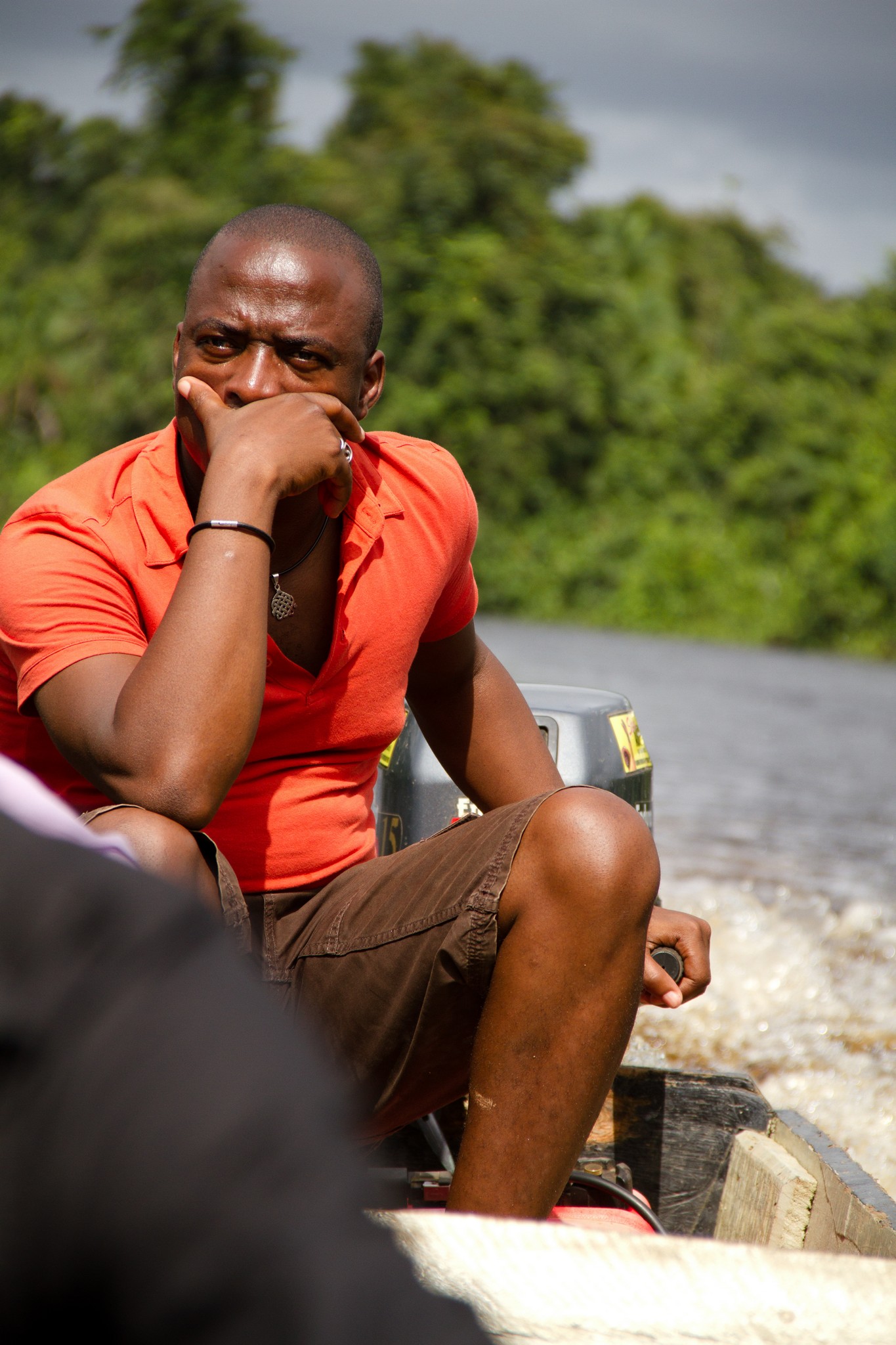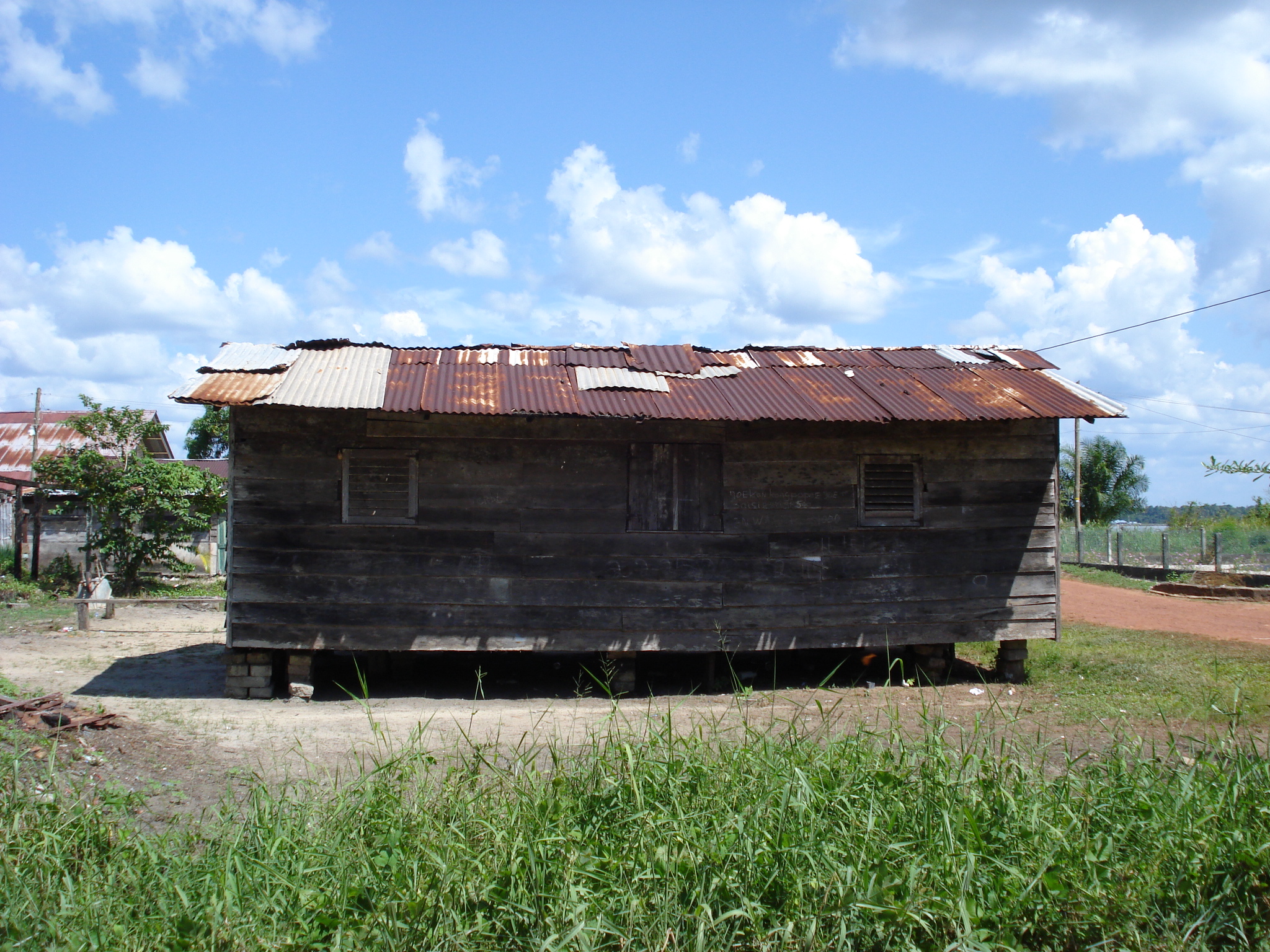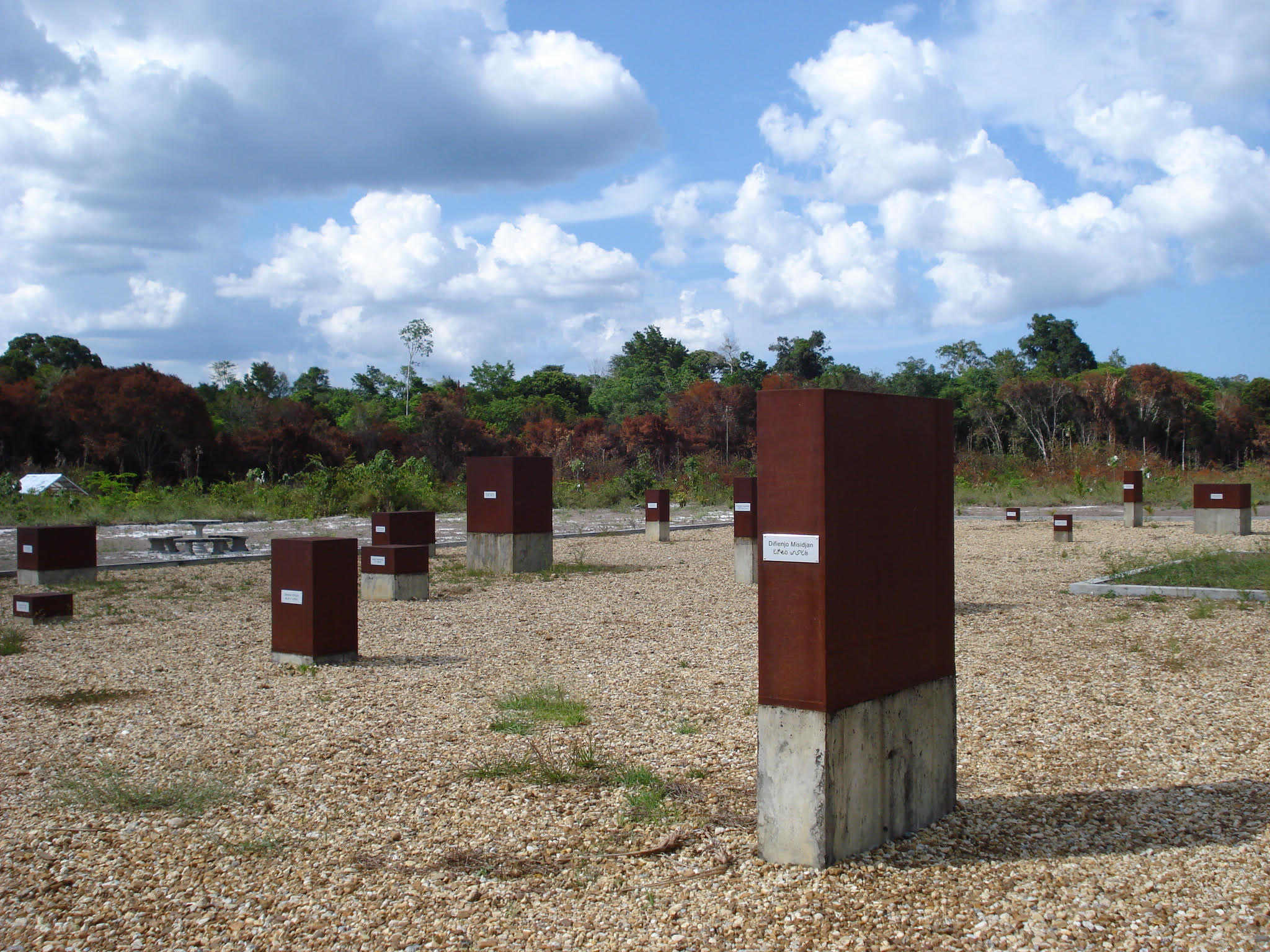Interview w/ Marcel Pinas (visual artist and community activist) - part 2
![]()
![]()
![]()
![]()
![]()
![]()






1. On Self, Selves and the World
What can my role be in the world?
In the case of my community,
How do I help them?
I am an artist
So I have to do it through art.
In the case of my community,
How do I help them?
I am an artist
So I have to do it through art.
. . . And being part of the process together, we reach somewhere
Can it work?
. . . I (want) to make my own people aware of the value of themselves
and I want 'outside' people to understand that it does not matter who we are,
Everybody is special
Everybody has something that the world needs.
Can it work?
. . . I (want) to make my own people aware of the value of themselves
and I want 'outside' people to understand that it does not matter who we are,
Everybody is special
Everybody has something that the world needs.
Suralco' has been working here for 100 years . . . What is left for the local community?
The poisoning or the dumping of the chemicals (in the river).
You do (economic) activities in that area . . . the monies you don't spend in that area;
You spend it in Paramaribo.
The poisoning or the dumping of the chemicals (in the river).
You do (economic) activities in that area . . . the monies you don't spend in that area;
You spend it in Paramaribo.
2. On Kibii and Community
We started the art park;
Artists come
They work with the local community. Together they work on (an) art object
I wanted (their sense of) ownership;
(Their being) part of,
So it's not anymore something alien coming here
They are part of the process.
Artists come
They work with the local community. Together they work on (an) art object
I wanted (their sense of) ownership;
(Their being) part of,
So it's not anymore something alien coming here
They are part of the process.
At least we could create a platform for them to perform
It was unbelievable for them to be there;
They came,
They said:
Wow!
This is for us to perform on;
For us to perform?"
You work on the profiling of them;
That they are special.
It was unbelievable for them to be there;
They came,
They said:
Wow!
This is for us to perform on;
For us to perform?"
You work on the profiling of them;
That they are special.
You see the change
So if I could answer the question:
Can art and culture help change or influence the community?
Yes,
It can.
So if I could answer the question:
Can art and culture help change or influence the community?
Yes,
It can.
3. On Knowledge Creation and Knowledge Transference
No . . . You have to be you,
You are maroon
You have something special
That's why it is very important to document our culture;
To present it (to) them, so (that) they can read about it;
(So that) they can listen
We will focus more on (the) visual
and (on) voice.
You are maroon
You have something special
That's why it is very important to document our culture;
To present it (to) them, so (that) they can read about it;
(So that) they can listen
We will focus more on (the) visual
and (on) voice.
They (will grow up) with part of their culture . . .
I went after two years
It was these kids who explained to me
about the museum;
(About) what is art.
I went after two years
It was these kids who explained to me
about the museum;
(About) what is art.
So I try to get them involved in a playful way;
To make them think about developing what is in them;
To take the culture with them in their future,
In whatever they want to do.
To make them think about developing what is in them;
To take the culture with them in their future,
In whatever they want to do.
We would like to express (ourselves) in different ways
about maroon culture in relation (to) . . .
Maroon culture in relation (to) architecture;
Maroon culture in relation (to) fashion;
Maroon culture in relation (to) education
We are thinking
a Moengo University based on traditional Maroon knowledge,
To share this (knowledge) with the world
We have expertise that the world needs.
about maroon culture in relation (to) . . .
Maroon culture in relation (to) architecture;
Maroon culture in relation (to) fashion;
Maroon culture in relation (to) education
We are thinking
a Moengo University based on traditional Maroon knowledge,
To share this (knowledge) with the world
We have expertise that the world needs.
It's unbelievable . . .
They were able to create their own script
They could (now) teach each other how to write and to communicate
That's something special
Imagine (trying) to survive in the rainforest
(and) then in the rainforest you are able to create;
. . . to think about aesthetics;
. . . to think about beautiful things.
They were able to create their own script
They could (now) teach each other how to write and to communicate
That's something special
Imagine (trying) to survive in the rainforest
(and) then in the rainforest you are able to create;
. . . to think about aesthetics;
. . . to think about beautiful things.
These spoons (are) part of the culture
That's what I caught,
The spoons with all the symbols inside
It is very important to preserve it; catch it; to preserve it
Every spoon has a symbol
That means it's a knowledge
Everybody has knowledge
We have to share that knowledge with each other
That's what we have to catch.
That's what I caught,
The spoons with all the symbols inside
It is very important to preserve it; catch it; to preserve it
Every spoon has a symbol
That means it's a knowledge
Everybody has knowledge
We have to share that knowledge with each other
That's what we have to catch.
And then there will be a language
That's what we want;
To create a language that leads back to our community.
That's what we want;
To create a language that leads back to our community.
4. On Childhood River Vignettes
The fight between the anaconda and the alligator;
That (could) last for days
It was always interesting to see that part
When they hear the engine, you start to see them moving
until one of them dies
It was something magical to see.
That (could) last for days
It was always interesting to see that part
When they hear the engine, you start to see them moving
until one of them dies
It was something magical to see.
Seeing these wild boar swimming . . .
You know
wild boar, they walk in groups (of) hundreds
Then they, crossing the river
Woh!
What magical moments.
You know
wild boar, they walk in groups (of) hundreds
Then they, crossing the river
Woh!
What magical moments.
Passing the villages, most of the time early in the morning,
You see children, women, men going to the river
to take a bath,
To do the dishwashing or sitting and fishing
Most times when the kids hear the boats coming,
They go (onto) the shore
Then they run!
They jump! . . . into the water
Yes, those were special moments.
You see children, women, men going to the river
to take a bath,
To do the dishwashing or sitting and fishing
Most times when the kids hear the boats coming,
They go (onto) the shore
Then they run!
They jump! . . . into the water
Yes, those were special moments.
There is a special fruit that (grows along) the river
And when it's ripe
It's ready to eat
It falls in the water
It's (an) orange fruit moving besides the boat
You try to catch as much as you can to eat
You see,
These are special things.
And when it's ripe
It's ready to eat
It falls in the water
It's (an) orange fruit moving besides the boat
You try to catch as much as you can to eat
You see,
These are special things.
Some parts of the river,
You don't want to look that way,
Where we have the cemetery.
Every morning we pass this space,
But then it's (like ) a dark hole in the forest.
As a kid you don't want to look that way.
. . . Yes, those are special moments.
You don't want to look that way,
Where we have the cemetery.
Every morning we pass this space,
But then it's (like ) a dark hole in the forest.
As a kid you don't want to look that way.
. . . Yes, those are special moments.
5. On Burying
No, no, no . . . that's a whole ceremony,
That's a whole ceremony
Where as kids, you are not part of
You have a lot of ceremony before taking (someone's body) to the burial ground
A lot of ceremony.
That's a whole ceremony
Where as kids, you are not part of
You have a lot of ceremony before taking (someone's body) to the burial ground
A lot of ceremony.
When someone dies the men go to the forest
They get wood to prepare the food
The wood is loaded (onto) the canoe(s)
They go with four or five canoes
and then the canoes are decorated.
With drum(s) . . . with (gunshots),
The men coming from forest; a ceremony on the water,
Dancing, shooting
They get wood to prepare the food
The wood is loaded (onto) the canoe(s)
They go with four or five canoes
and then the canoes are decorated.
With drum(s) . . . with (gunshots),
The men coming from forest; a ceremony on the water,
Dancing, shooting
With drum . . . with drum,
From one village to the other village
you hear the drum, then you know
Oh!
Something('s) happened
They tell stories with the drum . . .
Then there were special songs,
Special music type, drum type for burial
(and) for after the burial.
From one village to the other village
you hear the drum, then you know
Oh!
Something('s) happened
They tell stories with the drum . . .
Then there were special songs,
Special music type, drum type for burial
(and) for after the burial.
6. On Birthing and Becoming
They take care of the woman and the baby
The baby (has) to stay inside
After eight days the baby can come outside
To come outside, they have to do (a) ritual;
Communicate with the ancestor(s)
They have to take goods,
Pangi's for the kids
They let the child sit on the ground,
On the soil
That's also a special ceremony.
The baby (has) to stay inside
After eight days the baby can come outside
To come outside, they have to do (a) ritual;
Communicate with the ancestor(s)
They have to take goods,
Pangi's for the kids
They let the child sit on the ground,
On the soil
That's also a special ceremony.
A child is born
(If) a family member (dies) around that time,
Then they are connected (in one way or another)
If the child gets frequently sick;
Gets ill
Then they have to communicate with that person who died.
(If) a family member (dies) around that time,
Then they are connected (in one way or another)
If the child gets frequently sick;
Gets ill
Then they have to communicate with that person who died.
[No text]
7. On Sociological Frames
The river is part of all
The entire life of the maroon,
The river is very, very, very important
(We can do nothing) without (the) river;
Without water.
The entire life of the maroon,
The river is very, very, very important
(We can do nothing) without (the) river;
Without water.
You have to adopt other things
The rules that are in the village
(Are) not the same rules of the little town,
(Are) not the same rules in Paramaribo,
(Are) not the same as those in Holland.
The rules that are in the village
(Are) not the same rules of the little town,
(Are) not the same rules in Paramaribo,
(Are) not the same as those in Holland.
You can see that the war destroyed a lot,
A lot, really a lot
Recently people started to do that again;
(To wear) the pangi, the camisa
The war has destroyed a lot of our culture.
A lot, really a lot
Recently people started to do that again;
(To wear) the pangi, the camisa
The war has destroyed a lot of our culture.
As a boy you had to know how they make (a) canoe
When they (made) their canoe(s) you had to be there
You had to go help search for the wood
You had to be there to dig the hole
You had to be there (for) the burning process,
All the process(es)
It's like every man has to have his own canoe.
When they (made) their canoe(s) you had to be there
You had to go help search for the wood
You had to be there to dig the hole
You had to be there (for) the burning process,
All the process(es)
It's like every man has to have his own canoe.
Most of the time the canoe of the man is the small one;
For one or two person(s)
The woman one is the big one,
With all the kids;
All the goods.
For one or two person(s)
The woman one is the big one,
With all the kids;
All the goods.
So they placed boarding schools in important locations where people can go
If not,
Then they have boats,
Special school boats
that bring kids to school.
If not,
Then they have boats,
Special school boats
that bring kids to school.
So it's like you change the role
These people want to educate you all the time
They are the educators,
But now they have to change
I am the educator.
These people want to educate you all the time
They are the educators,
But now they have to change
I am the educator.
Then I ask myself:
What is education?
You talk about educating
Is education the western standard?
(Is) what my grandfather also taught me
About the canoe;
Is that not education?
It is the education we need (in order) to survive.
What is education?
You talk about educating
Is education the western standard?
(Is) what my grandfather also taught me
About the canoe;
Is that not education?
It is the education we need (in order) to survive.
There are a lot more similarities between the groups, than differences
Some of the tradition has been developing while living;
While doing things
It's like doing by learning;
Changing through the environment,
With the environment.
Some of the tradition has been developing while living;
While doing things
It's like doing by learning;
Changing through the environment,
With the environment.